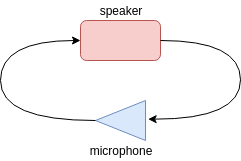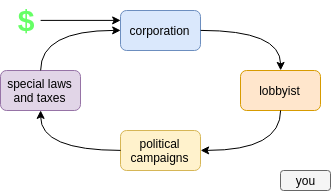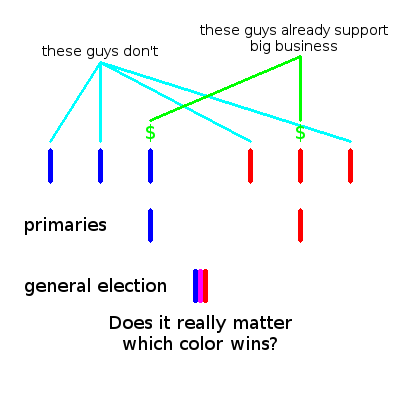
Systemic Corruption
Written on

The founders, in their wisdom, codified systemic means for the defense of liberty. Notably, the founders felt burned by several acts of the crown which they saw as impinging on their liberty and enacted specific constitutional protections against such infringements of government. As it happens, one of these protections has been twisted in a way that is no longer serves the requirements of the people which it was intended to protect, but instead, ensures that only those with money and influence are given access to government officials.
In this article, we would like to make a case that systemic corruption can occur without individual corruption. In effect, all of the individuals that make up the whole might be as pure as the driven snow, yet the system itself could still lose it's bearing.
The Right to Petition
The text of the First Amendment enshrines several of the freedoms that we likely take for granted in this country, including the right to petition - or lobby - our representatives:
Congress shall make no law respecting an establishment of religion, or
prohibiting the free exercise thereof; or abridging the freedom of
speech, or of the press; or the right of the people peaceably to
assemble, and to petition the Government for a redress of grievances.
The last portion - petition the Government for a redress of grievances - is the portion that we are concerned with at the moment.
Why the Right to Petition?
The right to petition the government was put into place because the authors perceived that they had little or no representation or ability to represent their own interest as citizens in the government of the Crown. On the surface this seems like the most basic and fundamental tenet of a republic, it is simply the right of a people to speak to their government.
A Citizen's Ability to Petition
It is clear that the average citizen has the right to petition, but does he have the ability?
Citizen Joe has a full-time job, a couple of kids, and dirty car that needs to be washed this weekend in his 'time off'. Simply put, the average voter has the right to lobby the government, but simply lacks the ability. Even when a so-called citizens' group scrapes together some money to hire lobbyists, they most often represent a small slice of the citizenry and rarely represent the true needs of the citizenry.
Citizen Joe might make it to Washington every 20 years or so to take part in a march. He might even give $100 to a campaign if he is really fired up. Despite his best intentions, Joe has no time and little money to exercise his 'right' to lobby his government.
Lobbying as a Profession - The Co-Opting of Citizens' Rights
Fortunately for Joe, he there are lots of people and corporations with Joe's interests in mind ready to pay professionals to advance Joe's agendas. Perfect! In addition, many CEO's of of the top companies find he time a few times each year to represent Joe on work time, often taking a trip to Washington to lobby multiple times a year!
Well, the professionals probably do have Joe somewhere on the agenda, certainly, but while they have the ear of a public official - and a nice campaign contribution - they might take the opportunity every now and then to represent their own interests.
Of course, we, the people, know that these guys are only representing their own interests. And why wouldn't they? They have the legal right and the ability to pay for representation.
Think of the groups that you are already aware of as having prominent lobbyist agendas:
- AT&T, Inc. - $16,370,000 (2016)
- Alphabet, Inc. (Google) - $15,430,000 (2016)
- Exxon Mobil - $11,840,000 (2016)
- National Association of Realtors - $64,821,111 (2016)
- National Association of Broadcasters - $16,438,000 (2016)
Is there anyone out there who legitimately thinks that Joe's and his family could hope to compete with the financial clout of such magnitude? By simple lack of resources, Joe has lost his 'right' to lobby the government by simply being crowded out by those with money. Effectively, the people have lost the right to petition their government.
The Positive Feedback Loop

A feedback loop is an engineering concept that describes a state in which the output of a system begins to have some effect on the input. An example of a negative feedback loop is discussed in our article on Closed-Loop Tax Policy. An example of a positive feedback loop is found when we place a microphone next to a speaker.... it gets really loud! The speaker produces a sound which gets amplified through the microphone, pushed back to the speaker at a higher volume and LOUD. Unfortunately, positive feedback loops are usually unstable and avoided throughout the engineering profession (with some exceptions) and it is very difficult to attenuate positive feedback loops without simply breaking them (unplug the microphone).

Lets talk about the loop:
- Corporations make money
- Corporations pay for lobbyists
- Lobbyist make campaign contributions
- Lawmakers make special laws or exceptions to their contributors
- Corporations make more money
See how the loop is actually circular? See how you, the majority of Americans, are not in the loop?
Paring Down the Political Field
Additionally, lobbying is often not along party lines. When an organization decides to influence public policy, they start checking out the candidates in the primaries. If you can get two candidates that will represent your interests going into an election, then it no longer matters which candidate wins! Again, the individual politicians being supported in this sort of system can be pure, but the system it self is driven to be more 'friendly' to those with money simply because those with money are the ones funding campaigns.

Lets take a look at a couple of other stats:
- Percentage of US adult population giving $200+ 0.67%
- Percentage of US adult population giving $2,700+ 0.10%
This means that 1 out of every 150 people are giving more than $200 to any campaign. Is that one person you? Do you know that person? Is that person acting in your interests? Of the 1 in 150 people, about 1 in 7 also gave over $2700. How much more do you think they gave?
Corporations win, lobbyists win, and campaigns/politicians win... do you?
Corruption of the Whole
Now, we are getting much closer to the point. The individuals in the feedback loop might be - as previously stated - pure as the driven snow, but the undue influence of money can still corrupt the system despite that fact! Consider:
- A politician may get contributions from a corporation because his interests are already in line with the organization's interests, not necessarily because he is agreeing to do something for the organization
- An organization may support a politician because he already represents an agenda that appeals to them
Neither of these activities are illegal nor are they even immoral! In this way, the agenda of those with resources is naturally placed ahead of those without resources. In a system in which representation is purchased with money, it is money that gets represented.
Clarifying Who can Lobby
Supreme Court rulings are pretty clear, pretty much anyone or any organization who can afford to can have unlimited access to the representation of the government. As stated earlier, the only way to stop a positive feedback loop is to cut it - pull the plug on the microphone.
After giving this some thought, I believe that the only solution is to simply decide that the government is by the people and for the people, not by the organizations nor for the money. Of course, only the Supreme Court could return this right to the people. It would require that several decisions be turned over, but necessarily so, in recognition of the fact that people no longer have equal rights to petition their representatives.
- All campaigns from primaries up must be publicly funded.
- The right to speak is not the right to spend money on a larger megaphone. If a rich man wishes to exercise free speech, he should try knocking on a few doors and speaking.
- Lobbying as a profession must simply be made illegal. Allow the citizens to walk up the steps of the Capitol Building to speak with their representatives to exercise their free speech... no campaign contribution required.
More Information and References
- Are lobbyists justified in a democracy?
- History of Lobbying in the US
- Open Secrets - 2016 Top Spenders
- Open Secrets - Doner Demographics
Category: corruption.